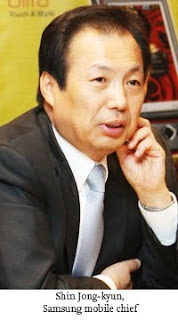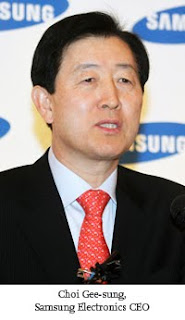
Samsung Electronics aims to sell more premium smartphones and advanced TVs, as well as chips and flat-screens.
``Samsung Electronics has continued to generate outstanding results despite an unfavorable economic climate and is widening the gap with regional competitors,’’ said Fitch Ratings. The company had a record-breaking year in 2011.
The world’s biggest manufacturer of memory chips and liquid crystal displays (LCDs), said demand for semiconductors for mobile products and servers remained solid despite a weaker showing in personal computers, due to competition from the rising popularity of tablets.

``Samsung aims at 180 trillion won in revenue or slightly more throughout this year. We are optimistic in attaining our target of $200 billion in revenue earlier than planned,’’ CEO Choi Gee-sung said recently.

Despite this the company admitted that its growth last year was slower than expected because of economic uncertainties in developed markets, the massive earthquake in Japan and the aftermath of massive flooding in Thailand.
In 2011 Samsung saw 7 percent revenue growth with a 165 trillion won total compared to the previous year, said investor relations chief Robert Yi.
The company and its affiliates plan to invest a record 47.8 trillion won this year on new product research and upgrading plants.
Samsung has diversified into value-added chips capitalizing on mobile application processors (APs) for tablets, smartphones and corporate servers.
The world’s biggest memory chipmaker sells twice as many ``specialty DRAM chips,’’ where margins are higher, as commoditized chips used in PCs, said Shinhan Investment in a recent report to clients.

One ace in the hole is the soaring popularity of Samsung’s Galaxy-branded smartphones.
The top smartphone seller in 2011, is pretty confident to outpace the Finnish handset maker Nokia to become the world’s biggest mobile phone producer, said CEO Choi.
It aims to sell over 130 million smartphones by the end of this year of a total 360 million target, according to company executives.
Smartphone sales in 2011 more than quadrupled from the year before, said Boston-based Strategy Analytics, generating record operating profit and revenue for the telecommunications division. Profit jumped 79 percent to 2.64 trillion won in the fourth quarter of last year.
``By expanding the lineup of smartphones and feature-based devices, Samsung will outpace market growth,’’ said Lee Young-hee, a senior vice president for the mobile division.

The company’s smartphone business was the biggest contributor to the corporation’s bottom line last year. With improving signs for traditionally-strong businesses ― chips, LCDs and TVs ― smartphones is the strongest provider of profits.
``In smartphones, the whole competition boils down to Apple and Samsung now,’’ said Lee Jin-woo, a fund manager at Seoul-based KTB Asset Management.
Samsung has been expanding its patent litigation against Apple after the latter sued it in April last year in the United States by claiming that ``Samsung slavishly copied the designs Apple smartphones and iPads.’’
The legal tussle has now spilled over into 10 countries, according to officials. The court fight is entering a ``big turning-point’’ after the latest ruling in Germany sided with Apple.
``The patent fight will have a lesser impact on Samsung’s smartphone business because we will release more models in all markets,’’ said a spokesman.
Samsung is also preparing a comeback in its television business after last year’s dismal performances hit by the debt-crisis in the eurozone and declining prices.
The company aims to sell 50 million flat-screen TVs this year, according to executives. ``Samsung sold 43 million, last year and we are aiming to sell 15 percent more this year,’’ said Yoon Boo-keun, the chief of the consumer electronics division.
This year’s key phrase for the company’s TV business is ``beyond comparison,’’ said Yoon, expecting demand in emerging markets to ``significantly grow.’’
Samsung is adding more features to its Web-connected or ``Smart TVs,’’ the TVs that allow users to download apps, movies and surf the Internet. Samsung defines a smart TV as having built-in computer-style processors and a software platform that allows for custom-made applications.
``Last year, sales of smartphones and tablets negatively affected TV demand, but this year, those products will create synergies with smart TVs,’’ said Yoon, adding Samsung is prepared to fight Apple over ``Apple TVs,’’ which will be released sometime in the second half.
In personal computers, which Samsung has seen higher growth over the past few years, its chief Nam Seong-woo said the company will sell 19 million this year up from 14 million in 2011.
``That’s enough to lift the worldwide ranking to the 6th biggest manufacturer. We are on track. We will gain more profitability by selling more premium-level products,’’ said Nam.
In chips and flat-screens, Samsung confirmed its bullish stance to widen market gaps with its rivals.
Out of the total allocation for semiconductors this year ― 15 trillion won ― the world’s biggest memory chipmaker plans to invest 9 trillion won in the less-volatile and profitable non-memory chips.
These chips are used to control an entire computing system and are more profitable. Samsung supplies some of these chips to Apple.
In conventional memory chips, Yi said the company will raise the portion of DRAM chips using below 30-nanometer processing technology to 60 percent by the end of the year, while that for NAND flash chips using 20-nanometer will be over 90 percent.
In the fourth quarter, the semiconductor division had a 2.31 trillion won operating profit on 9.17 trillion won in revenue, on the back of the rising shipment of more profitable chips.
The spending amid technology migration and rising profit contrasts with Asian rivals including Japan’s only DRAM chipmaker Elpida Memory, which was unprofitable for four straight quarters to September and faces a deadline to repay debts.
``We’ve acknowledged that Elpida is moving to integrate business management with Micron Technology of the United States and Nanya from Taiwan as a strategy to compete with Samsung and even Hynix, however, we don’t worry too much,’’ said a senior executive.
In organic light-emitting diode (OLED) business, considered the next-generation display format that will eventually replace LCDs and plasma panels, Samsung plans to invest 5 trillion won out of 6.6 trillion won allocated to its entire display-panel business.
``Our LCD screen business was in the red last year. But we will do our best to see an early turnaround in the display-making business by expanding OLED production and cutting costs in LCDs by using advanced technology,’’ said Yi.
Source: The Korea Times

No comments:
Post a Comment